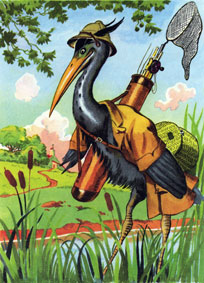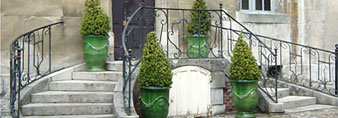INTRODUCTION
TO MADAME DE MONTESPAN.*
The Apologue's a gift the gods sent down,
Or if a present by a mortal made,
Whoe'er he was, he well deserved a crown,
To deck immortally his godlike head.
It is a charm divine that wins the soul,
Holding the passions under sweet control :
The varied histories for ever gay,
Allure and lead the captive mind away.
O fair Olympe, if ever muse of mine
Her place has taken at the board divine,
Now deign to look upon my gifts to-day,
Favour the games with which I love to play,
For you the envious tooth of Time will shun
My work, and let it years on years survive.
He who would have his work live, when his sun
Of life is set, should for your suffrage strive.
’Tis you who give my writings all their worth ;
No critic on this earth
Can tell their charm and grace so well as you,
The mistress of sweet looks and speeches. True
It is that on so dear a theme, a field
So fair, I fain would longer rove ;
But to a greater master t I must yield,
Who seasons all your praises with his love.
It is enough if to my latest toil
Your name should serve for rampart and for shield,
And guard the favourite which yet may yield
A second life to me, maugre men's coil
Of spite and slander ; sa the good shall call
My book, through you, worthy the eyes of all.
I merit not so great a favour, I,
The fable asks what you will not deny.
You know the force of fable on the heart;
And if through it I please you in some part,
A temple then to Fable will be due,
But I would build no temple save for you.
* Born in 1641, died in 1707.
Her liaison with the king (Louis XIV) began in 1668
|
THE ANIMALS SEIZED WITH THE PLAGUE
(VII, 1)
An evil that spreads terror round,
An evil heaven in fury found,
To scourge the crimes of nations lost to shame ;
The plague—since we must call it by its name,
That in a day can glut the throat of hell,
Made war on animals, and sick they fell.
All did not die, but all were struck with death,
And no one cared to hold the parting breath.
Careless, and ready to expire,
No dish excited their desire ;
The wolf and fox no longer stray,
To seize the mild and harmless prey ;
The turtles fled each other, coy.;
No more love was then, nor joy.
"Dear friends," the lion, holding council, cries,
" This scourge, I fear, must from our crimes arise ;
Let then the blackest of us all in vice
Self-offered, straight to heavenly vengeance fall,
Which may bring health again to all.
We learn from history, some nobly great,
Thus freely died to save a falling state :
Then let us all, without disguise, begin
To view the state our consciences are in.
To satisfy my gluttony, I own
Many a sheep I've gobbled down :
They, weak and harmless, never injured me ;
Nay, I have ate sometimes—in murder deeper—
Their honest keeper.
If need, I'll therefore now the victim be ;
But let me say that all, as well as I,
Should spread their crimes before the councils eye,
Because the guiltiest only ought to die."
" Sire," cried the fox, " you are too good a king,
Your doubts from too much delicacy spring.
Eating mere mutton, worthless silly sheep,
Is that a sin ? Should that disturb your sleep ?
Far from your majesty these humble tones ;
You did them honour when you cracked their bones.
As to the shepherd, were he here, I'd tell him
He well deserved the evil that befell him ;
As one of those who hold a fancied sway
Over the beasts that are a common prey."
Thus spoke the fox, while flattering peers stood round.
They did not therefore dare to sound
The lesser crimes of chiefs assembled there,
Such as the tiger, wolf, and bear ;
The wrangling race, to curs of common kind,
All passed for saints, as each explained his mind.
The ass came in his turn, and thus did say :
" I have some slight remembrance, that one day,
Passing some meadows that to monks belong,
Hunger was urgent, and the grass was new,
Pushed on, I fancy, by some demon too,
I cropped therein the bigness of my tongue ;
Since I must speak, I own that I was wrong."
" Stop thief ! " they cried, and all the ass impeach.
A lawyer-sort of wolf proved by a speech
That they that cursed animal must kill,
A scabbed wretch, the cause of all their ill.
What dreadful crime ! eat other people's grass !
So for a hanging case they made it pass ;
Nothing but death could for the deed atone,
Which to the ass was quickly shown.
According as you're feeble, or have might,
High courts condemn you to be black or white. |
 |
| The Heron : Illustration for a children's book |
|
THE HUSBAND ILL-MATCHED (VII, 2)
If goodness were to beauty ever joined,
I would a wife to-morrow find;
But as divorce 'twixt these is nothing new,
And few fine bodies lodge a lovely mind,
Presenting both at once to view,
Excuse me, if the marriage path I shun.
I've many matches seen, been lured by none.
Almost the whole four parts of humankind
Rush boldly on to be undone:
Almost the whole four parts repent it too.
But let me here the story tell of one,
Who, sore repenting, knew not what to do,
Unless to send away his wife,
So greedy, jealous, fond of strife.
Her nought could please, nothing gave her repose—
Too soon they bedded, or too late they rose :
She would have this, and then have that,
And then again she knew not what.
The servants mad, the husband groaned in thrall :
Sir thinks of nothing, and Sir squanders all ;
Sir runs about, and Sir takes too much rest.
She said so much, at last Sir thought it best,
Thus tired to hear her clapper of a mill,
To send her to her country friends so still.
Behold her then in sylvan scenes of peace,
With Susans—guardians of pigs and geese.
Some time elapsed—they thought her milder now ;
He took her back, and said : “ Well, how've you been ?
How did you pass your time, my pretty queen ?
Come, tell me how
Did you with rural innocence agree ?”
“ Oh, pretty well,” she said; “but then to see.
The rustics lazier still than here,
The flocks give them no care nor fear :
I told them of it well, and got their spite—
The careless brutes—they could not bear my sight.”
“ What !” cried the husband, in a hasty tone,
“ If you are such a very vixen grown,
That those you live with, whom you only see
The moments they return at night—
If they your hateful presence flee,
What then can servants do, who all day long
Must bear the lash of your unbridled tongue ?
And what then must a husband do,
Doomed to be night and day with you ?
Back to the farm—adieu! If e'er in life
I call you back, in longing for a wife,
May I, to purge my sins when dead and gone,
Be plagued with two like you instead of one” |
THE RAT RETIRED FROM THE WORLD (VII, 3)
Levanters in their legends say,
A certain rat, grown weary of this life,
Within a large Dutch cheese, afar from strife,
Retired to fast and pray.
He made the solitude profound,
Daily extending it around.
There our new hermit passed the lonesome day:
With teeth and claws he worked so well,
He soon dug out a spacious cell,
Had house and food—what could he more require?
He soon grew fat and round, for God is kind
To those who to his service are resigned.
One day, to our devoted sire
A deputation came of needy rats,
Asking some little alms for their poor band,
As they were travelling to a foreign land,
To seek for succour ’gainst a race of cats.
“We’re forced to travel without food,” they said,
“Our commonwealth attacked is very poor;
Ratopolis is in a close blockade,
Yet very soon we shall have powerful aid;
We therefore ask but little at your door.”
“My friends,” the hermit cried, shaking his head,
“Things here below disturb my thoughts no more.
What can a poor recluse be thought to do,
But pray to Heaven to help you through ?
I hope He'll have some care of you.”
Thus having said, our new-made saint
Shut fast his door as off they went.
Reader, whom do I mean, or what,
By this unfeeling greedy rat?
A monk?—Oh no, the tale a dervish shows,
For monks are charitable, I suppose. |
THE HERON (VII, 4)
One day went strutting on the river's banks,
The long-necked heron--long beak and spindle-shanks.
The stream was clear as on the finest days,
While Mother Carp a thousand gambols plays
With Father Pike, attracted by the rays.
They came so near, 'twas just as heron might please,
He could have gulped them up with ease ;
But he thought fit to stroll along,
Until his appetite got strong.
He lived by rule, had stated hours for food.
His stomach came, and now, with greedy eyes,
The bird approached the border of the flood—
Saw tenches from their low abode arise.
That dish displeased him ; with disdainful air
He lounged along to look for better fare,
Something like Horace's disdainful rat.
“ Tenches !” he cried, “" a heron stoop to that !
Whom do they take me for, or what ?”
Tenches rejected, gudgeons hailed him next‑
“A heron dine on gudgeons ! ” cried he, vexed ;
“ Open for these my beak !
I'd rather fast a week.”
At last he oped it for a homelier dish,
When he no longer saw a single fish ;
Hunger came fast, and glad was he that day
To feast on snails that could not run away.
To be so nice is not quite wise,
For they do well, and only such,
Who run no risks to gain too much.
Beware, and nothing good despise,
Above all, when so near your fickle wish.
But here no more about the heron’s dish,
Mortals, I speak to you, and let me tell
Another tale that suits my lesson well.
|
|



